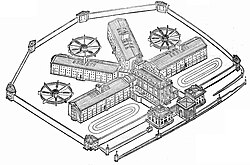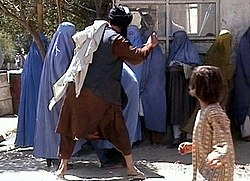
Back Penitensiar sistem Azerbaijani Sistema penitenciari Catalan Strafvollzug German Sistema penitenciario Spanish Espetxe-sistema Basque Système pénitentiaire French תקון HE Pemasyarakatan ID 矯正 (法学) Japanese Pataisos įstaiga Lithuanian
The examples and perspective in this article may not represent a worldwide view of the subject. (October 2011) |
| Criminology and penology |
|---|
 |


In criminal justice, particularly in North America, correction, corrections, and correctional, are umbrella terms describing a variety of functions typically carried out by government agencies, and involving the punishment, treatment, and supervision of persons who have been convicted of crimes.[1] These functions commonly include imprisonment, parole, and probation.[2] A typical correctional institution is a prison. A correctional system, also known as a penal system, thus refers to a network of agencies that administer a jurisdiction's prisons, and community-based programs like parole, and probation boards.[3] This system is part of the larger criminal justice system, which additionally includes police, prosecution and courts.[4]

"Corrections" is also the name of a field of academic study concerned with the theories, policies, and programs pertaining to the practice of corrections. Its object of study includes personnel training and management as well as the experiences of those on the other side of the fence — the unwilling subjects of the correctional process.[1] Stohr and colleagues (2008) write that "Earlier scholars were more honest, calling what we now call corrections by the name penology, which means the study of punishment for crime."[5]
- ^ a b Mary Stohr; Anthony Walsh; Craig Hemmens (2008). Corrections: A Text/Reader. Sage. p. 1. ISBN 978-1-4129-3773-3.
- ^ Bryan A. Garner, editor, Black's Law Dictionary, 9th ed., West Group, 2009, ISBN 978-0-314-19949-2, OCLC 420487111 0-314-19949-7, p. 396 (or p. 424 depending on the volume[clarification needed])
- ^ Correctional system is defined as "a network of governmental agencies that administer a jurisdiction's prisons, and parole system" in Bryan A. Garner, editor, Black's Law Dictionary, 9th ed., West Group, 2009, ISBN 0-314-19949-7, p. 396, which does not define "penal system".
Blomberg and Lucken (2010) describe the post-1940 penal system in the United States of America as composed of "prisons, reformatories, parole, probation, juvenile courts [?], local jails, and a declining number of workhouses", and with added detail that "[h]owever the main focus of the system was on expanding and differentiating prisons, parole, and probation" in Thomas G. Blomberg; Karol Lucken (2010). American penology: a history of control. Transaction Publishers. p. 110. ISBN 978-0-202-36334-9.
Stohr et al., p. 1 distinguish prisons from community-based correctional programs like parole and probation. - ^ Michael Cavadino; James Dignan (2007). The Penal System: An Introduction. SAGE Publications. p. 1. ISBN 978-1-4129-2946-2.
- ^ Mary Stohr; Anthony Walsh; Craig Hemmens (2008). Corrections: A Text/Reader. Sage. p. 2. ISBN 978-1-4129-3773-3.